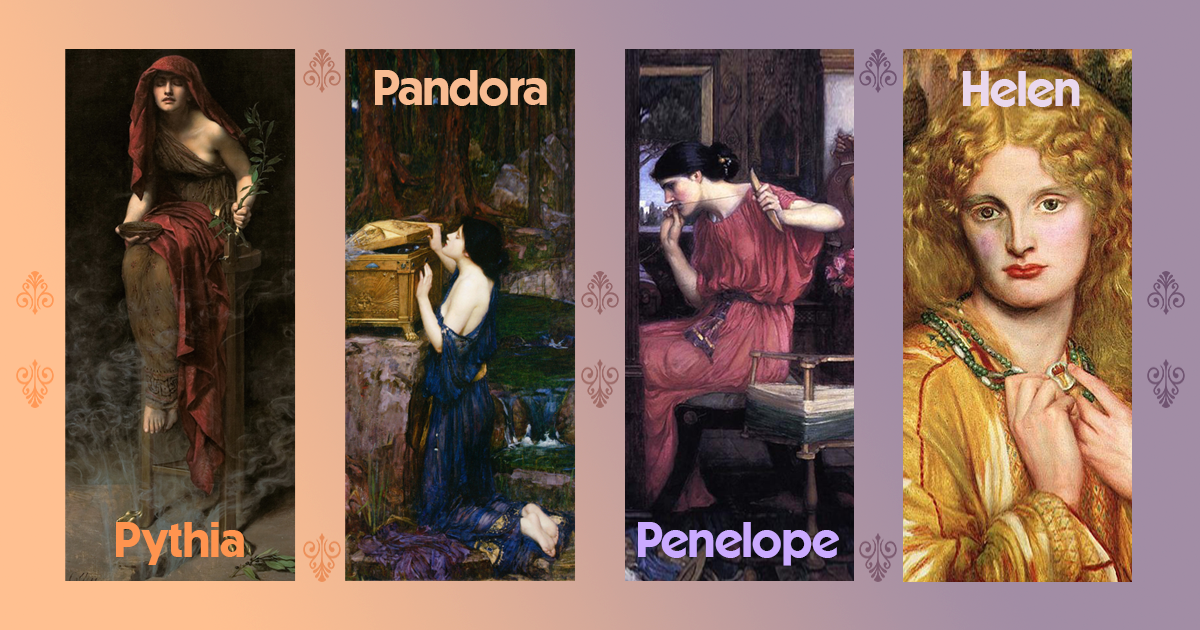
Greek mythology contains tales of divine and valiant female heroes renowned for their exploits. The role of women in Greek Mythology was essential, since Greek Goddess were as strong and powerful as Gods. Each of them had her own temper and was not ideal, same as humans. They could be angry, revengeful, and even manipulative, sometimes they were incredibly kind, generous, and tender. Greek Goddess had a lot of responsibilities and areas of influence, which helped to highlight their characteristics even brighter. Here are the most well-known Greek Goddesses. Check, which Greek Goddess you would be!

Pythia
Priestesses were also popular in various cults dedicated to the Greek pantheon of goddesses. But the Pythia of Apollo was arguably the most famous and potent of all priestesses. In ancient Greek religion, the Pythia occupied a special status. She is referred to by the words hiereia (priestess), mantis (seer), and prophetis in ancient literature (prophet). The Pythia is best described as an agent of Apollo because she "acted" on his behalf during the consultation process.
According to Plutarch, the Pythia was chosen from a respectable family, though not necessarily wealthy. Before sunrise, Pythia's day had begun. Her first chore was cleaning herself, which she accomplished in the neighboring Castalian Spring's holy waters. The Adyton was a particular space inside the Temple where visitors met the Pythia. The Pythia served as Apollo's primary channel for speaking his divine words.
Pandora
The first mortal lady created from clay by the gods was PANDORA. When Pandora opened the storage jar that her husband Zeus had given her as a wedding gift, she let loose the evil spirits that were sealed inside. These would continue to haunt humanity forever. The only blessing left behind to lessen human suffering is Elpis (Hope).
Throughout Christian history, it has been widely accepted that Pandora was a "type of Eve." The elements of their stories that had parallels were emphasized so that Pandora became a "Greek Eve" and Eve became a "Christian Pandora" because of Pandora's importance in Graeco-Roman philosophy, literature, and mythology.
Both Eve and Pandora are the first women in the world's history. They both hold a key position in the change narrative from an initial state of plenty and ease to one of sorrow and death. Both were modeled after men. Both are tempted to act contrary to their better judgment. They both contributed to the spread of evil in the world.
Penelope
Penelope married Odysseus, King of Ithaca, and they had a son named Telemachus. While Odysseus was away with the Achaeans fighting Troy, Penelope raised Telemachus. She raised their son while managing their household, which included several responsibilities. Penelope would weave during the day to keep the pesky suitors at bay. She would undo the progress she had made during the day at night. As a result, a project that should have taken a few months at most took three years.
In this way, Penelope saved time by not marrying one of the suitors before her husband returned. Penelope from Homer's Odyssey is not a historical figure, although she is remembered in Greek literature for her heroic qualities. During her husband's absence from Ithaca, she demonstrated these characteristics while overcoming the obvious barrier of gender.
Helen of Troy
According to her mythological ancestors, Helen is the daughter of Zeus and the goddess Nemesis. However, the most popular origin story is that she was the daughter of Zeus and Leda, an Aetolian princess who grew up as the Queen of Sparta. Helen first appears as a historical figure in Homer's Iliad and Odyssey.
The story of Helen begins with her abduction by Prince Paris of Troy. According to legend, Paris was asked by the goddess Aphrodite to choose the most beautiful of the three goddesses, and he chose Aphrodite in exchange for the promise of the most beautiful woman in the world. Aphrodite fulfilled her promise by orchestrating Helen's abduction and taking her to Troy.
The Greeks, outraged by the abduction of their queen, launched a fleet of a thousand ships to attack Troy and retrieve Helen. This conflict, known as the Trojan War, lasted for ten years and was fought greatly on both sides.
During the war, Helen was often portrayed as a passive figure, a prize to be won by whichever side emerged victorious. However, some accounts suggest that she played a more active role in the war, using her beauty and charm to manipulate the men around her.
After ten years of fighting, the Greeks defeated the Trojans by tricking them with the famous Trojan horse. Helen was returned to her husband, Menelaus. Some versions of the myth suggest that she was punished for her role in the war by being forced to marry one of Menelaus' servants.
It may be impossible to discover the real Helen, especially when men portray her. On the other hand, Sappho may provide the most accurate portrayal of Helen. Helen is neither a victim nor a culprit in her poetry; instead, she is given her voice, one that understands the consequences of her choices while still choosing to love over all else.

In Greek mythology, many powerful goddesses were worshiped for their strength,
intelligence, beauty, and wisdom. Some of the most powerful and revered goddesses were
Helen of Troy, Pandora, Penelope, and Pythia.Each of these goddesses had unique strengths
and qualities. Identifying which is most relatable to you, depends on your traits and interests.
Ultimately, the most powerful goddess in Greek mythology may be a matter of personal
interpretation and preference, as each of these powerful goddesses was revered and
celebrated in her own right.